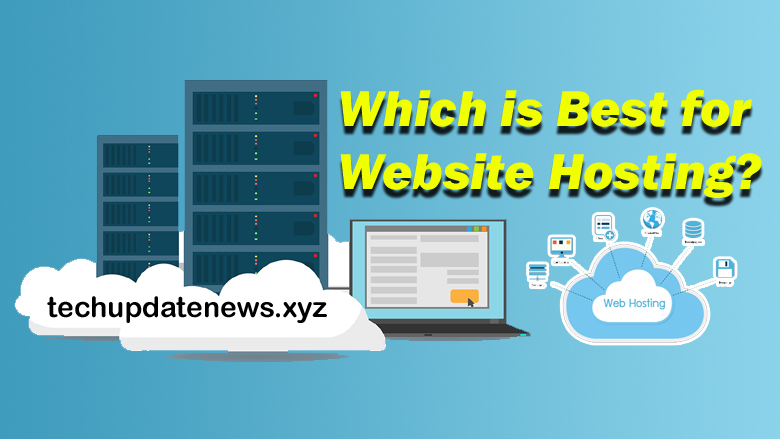Which is Best for Website Hosting?

Which is Best for Website Hosting?. In the dynamic world of website management, choosing the right hosting solution is a pivotal decision that significantly influences the performance and success of your online presence. From shared hosting to dedicated servers, and the increasingly popular cloud hosting, each option comes with its own set of advantages and drawbacks. In this article, we will delve into the intricacies of different hosting types, providing you with valuable insights to make an informed decision tailored to your website’s needs.

Which is Best for Website Hosting
A. Importance of Website Hosting
Your website’s hosting is the bedrock of its functionality. It’s where your files, data, and content reside, making it accessible to users worldwide. A reliable hosting service ensures seamless user experiences, faster loading times, and optimal website performance.
B. Factors to Consider in Choosing Hosting
Before delving into specific hosting types, it’s crucial to understand the factors that should influence your decision. Considerations such as website traffic, budget constraints, and technical requirements play a pivotal role in determining the most suitable hosting solution.
Shared Hosting
A. Definition and Features
Shared hosting is like renting a room in an apartment—multiple websites share the same server resources. It’s a cost-effective solution, making it ideal for small to medium-sized websites.
B. Pros and Cons
Pros:
- Cost-effective
- User-friendly for beginners
Cons:
- Limited resources
- Vulnerable to server load from other sites
Virtual Private Server (VPS) Hosting
A. Explanation and Characteristics
VPS hosting provides a virtualized private server within a larger physical server. It offers more resources and control compared to shared hosting, making it a scalable option.
B. Advantages and Disadvantages
Pros:
- More control and customization
- Scalable resources
Cons:
- Higher cost than shared hosting
Dedicated Server Hosting
A. Overview and Key Attributes
Dedicated server hosting provides an entire server exclusively for your website. It offers unparalleled control, customization, and performance.
B. Pros and Cons
Pros:
- Full server control
- High performance
Cons:
- Expensive
- Requires technical expertise
V. Cloud Hosting
A. Definition and Unique Aspects
Cloud hosting utilizes a network of virtual servers to distribute resources. It’s known for its scalability, reliability, and flexibility.
B. Benefits and Drawbacks
Pros:
- Scalability
- High reliability
Cons:
- Costs can scale with usage
Which is Best for Website Hosting
Factors to Consider
A. Website Traffic
The amount of traffic your website receives is a key factor in choosing the right hosting. Shared hosting may suffice for low-traffic sites, while high-traffic websites might benefit from VPS or dedicated hosting.
B. Budget Constraints
Your budget plays a crucial role. Shared hosting is budget-friendly, while dedicated servers are a larger investment. Evaluate your financial capabilities against your website’s needs.
C. Technical Requirements
Consider the technical demands of your website. E-commerce sites, for example, might require more resources and security features than a personal blog.
Best Gaming Computer From Best Buy! 🎮 | Discover Your Perfect Play
Performance Metrics
A. Speed and Uptime
Website speed and uptime are critical for user satisfaction. Different hosting types offer varying levels of speed, with dedicated servers often providing the best performance.
B. Scalability and Resources
Scalability is essential as your website grows. Cloud hosting is renowned for its scalability, adapting seamlessly to changing resource demands.
Security Measures
A. Importance of Security
Website security is paramount. Evaluate the security features offered by different hosting options to protect your data and user information.
B. Security Features Across Hosting Types
While shared hosting may be more vulnerable, dedicated servers and VPS hosting often come with robust security measures. Cloud hosting, too, offers advanced security protocols.
Customer Support
A. Significance of Support
Reliable customer support is invaluable, especially if you encounter technical issues. Assess the level of support provided by different hosting services.
B. Support Availability in Different Hosting Types
Shared hosting services may have more basic support, while VPS and dedicated hosting often come with dedicated support teams.
User-Friendly Interfaces
A. Importance for Beginners
If you’re new to website management, an intuitive interface can significantly ease the learning curve. Shared and cloud hosting platforms are often more user-friendly for beginners.
B. Ease of Use Across Hosting Platforms
While dedicated servers may offer more control, they often require technical expertise. Consider your comfort level with managing server configurations.
Case Studies
A. Real-World Examples
Examining case studies of websites with similar needs can provide practical insights into the effectiveness of different hosting solutions.
B. Success Stories and Challenges
Learn from success stories and challenges faced by websites in your industry. This can guide your decision-making process.
Future Trends
A. Evolving Hosting Technologies
Stay abreast of emerging hosting technologies. The industry is dynamic, with new innovations regularly enhancing hosting capabilities.
B. Predictions and Emerging Innovations
Predictions about the future of hosting can help you choose a solution that aligns with evolving technological trends.
Making Your Decision
A. Summing Up Key Considerations
Evaluate the information gathered and weigh the pros and cons of each hosting type against your website’s specific requirements.
B. Decision-Making Process
Making a decision involves balancing your budget, technical capabilities, and the unique needs of your website. Choose a hosting solution that aligns with your long-term goals. Which is Best for Website Hosting
Conclusion
A. Recap of Hosting Types
In conclusion, shared hosting, VPS hosting, dedicated servers, and cloud hosting each have their merits and drawbacks. The best hosting for your website depends on your unique needs and circumstances. Which is Best for Website Hosting
B. Choosing the Best Fit for Your Website
Consider all factors discussed, assess your website’s requirements, and make an informed decision based on what aligns best with your goals.
Unleash Your Power with the Best Gaming Laptop: Your Ultimate Guide
FAQs
A. What is shared hosting, and is it suitable for my blog?
Shared hosting is a cost-effective solution where multiple websites share the same server resources. It’s suitable for blogs with low to moderate traffic.
B. Can VPS hosting handle high traffic websites?
Yes, VPS hosting is scalable and can handle higher traffic volumes compared to shared hosting.
C. Are dedicated servers worth the investment for small businesses?
For small businesses with growing resource needs and the budget for it, dedicated servers can offer unmatched performance and control.
D. How secure is cloud hosting compared to other options?
Cloud hosting is known for its robust security features, making it a secure option compared to shared hosting.
E. What hosting type is recommended for e-commerce websites?
E-commerce websites often benefit from the scalability and security features of VPS or dedicated hosting.
6 Comments